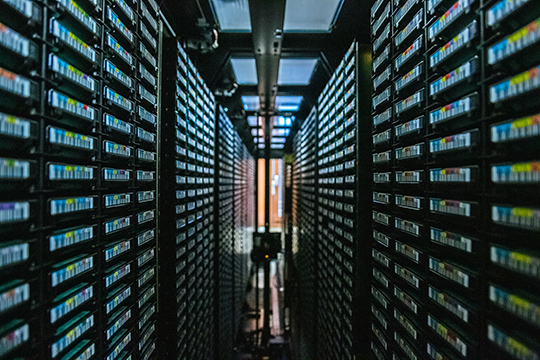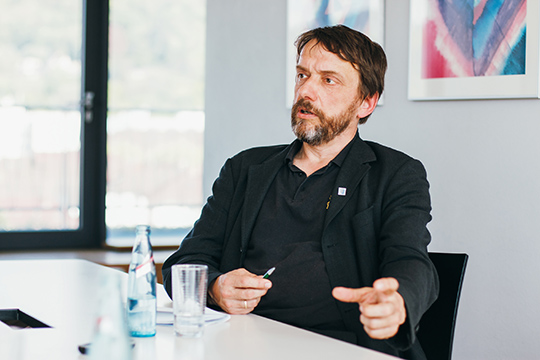Publish in advance, debate afterwards
Freiburg, Jan 26, 2021
Results of research are no longer only published in books or journals but also digitally on pre-publication servers (PPS) where researchers can release results that are not yet peer reviewed, that is, assessed by experts in the field. Wolfgang Hochbruck, Professor of North American Studies at the University of Freiburg, as a member of the board of the Gesellschaft für Sicherheitswissenschaft (GfS), the German society of security scientists, has issued an opinion looking at this innovative means of publication. Hans-Dieter Fronz talked with him about their advantages and disadvantages to science.
 Exchange in digital space: could scientists have made such rapid progress researching coronavirus without pre-publication servers? Photo: Sandra Meyndt
Exchange in digital space: could scientists have made such rapid progress researching coronavirus without pre-publication servers? Photo: Sandra Meyndt
Professor Hochbruck, why are research results published in advance on pre-publication servers?
Wolfgang Hochbruck: It increases scientific freedom. Until now there have frequently been lengthy waiting periods between submitting a text to a renowned scientific journal and its publication, simply because there’s great demand. On a pre-publication server researchers can set what’s ready for publication. Then others can take a look and comment.
So it’s mainly about being able to respond swiftly to results?
Yes, exactly. We definitely wouldn’t have got as far with researching coronavirus this quickly if it weren’t for this form of exchange. In fact, researchers from Australia, China, North America, Great Britain and Germany were all pulling together. One obvious example is the virologist Prof. Dr. Christian Drosten who posted a publication on a PPS. It received criticism, so he took it down, revised it and then released it again with amendments. This was criticized in the German media along the lines of: “He shouldn’t put out something unfinished.” But his example makes it clear how science works and how progress is achieved, that is, in an open process whereby knowledge is refined and as a result improved.
In an opinion released by the GfS, you speak about the bewildering range of publications and the flood of information. Don’t pre-publication servers reinforce this development?
You do wonder who can keep an overview. And someone can claim, for example, that they’ve found a great solution while other researchers dismiss it. Some science journalists lie in wait on these platforms for an issue that can be used, then pick it up, and this creates unnecessary political waves. But the real problem is how it’s passed on, this novel phenomenon of the post-factual. After all, facts themselves can’t be changed, but their communication can. What’s circulated and how? How is it discussed? If some hyped nonsense is given the same importance as the verifiable, then it gets another degree more complex. And potentially dangerous.
 The problem of the post-factual: things become potentially dangerous if hyped nonsense is given the same importance as scientific facts, thinks Wolfgang Hochbruck. Photo: Sandra Meyndt
The problem of the post-factual: things become potentially dangerous if hyped nonsense is given the same importance as scientific facts, thinks Wolfgang Hochbruck. Photo: Sandra Meyndt
But the bottom line is: you’re nevertheless convinced that these platforms represent progress?
I reject hierarchical structures, and especially the exploitation of scientific results by a very few academic publishers. If this practice prevails as an intermediate form of scientific publication and we can prevent it falling into the wrong hands, that’s science as it really should be. That is, an open, collegial exchange with the objective of action for those concerned. After all, good and lasting results are published in the end. It works with the right scientific ethos behind it.
When researching coronavirus it was clearly worthwhile to make results that hadn’t yet been evaluated accessible. But isn’t a form of evaluation necessary in the end?
Here we need to take another starting point. We have to leave behind the idea: “I have to publish in order to get more funding.” This drive for quantity has led to masses of publications. In the natural and engineering sciences they have in some cases been spread so thinly that it’s impossible to have an overview. And fifty percent of all publications in the humanities aren’t read by anyone. All of this was part of a culture that was designed to show that there is scientific activity.
When did this avalanche of scientific publications actually begin?
It probably started in the 1970s when the large phase of expansion of academic activities ended for a while and there wasn’t a constant supply of new scientific posts. This intensified competition between researchers, and the number of publications rose rapidly. Since about ten years ago there have been efforts to curb this a little and introduce greater qualitative evaluation systems.
How optimistic are you that scientific publication is heading in the right direction?
If I weren’t optimistic I couldn’t do my job. I do have my black moments, but mostly I’m pretty upbeat. And honestly, the way science has dealt with the coronavirus so far, I find this very encouraging from a security science point of view too.
Opinion of the Gesellschaft für Sicherheitswissenschaft (GfS)

